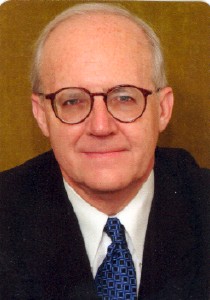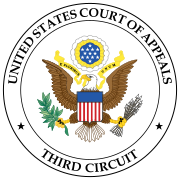Wallace v. Jaffree, 472 U.S. 38 (1985), was a United States Supreme Court case deciding on the issue of silent school prayer.
Tinker v. Des Moines Independent Community School District, 393 U.S. 503 (1969), was a landmark decision by the United States Supreme Court that defined First Amendment rights of students in U.S. public schools. The Tinker test, also known as the "substantial disruption" test, is still used by courts today to determine whether a school's interest to prevent disruption infringes upon students' First Amendment rights.
United States v. O'Brien, 391 U.S. 367 (1968), was a landmark decision of the United States Supreme Court, ruling that a criminal prohibition against burning a draft card did not violate the First Amendment's guarantee of free speech. Though the court recognized that O'Brien's conduct was expressive as a protest against the Vietnam War, it considered the law justified by a significant government interest unrelated to the suppression of speech and was tailored towards that end.

Danny Julian Boggs is an American attorney and a senior United States circuit judge of the United States Court of Appeals for the Sixth Circuit. He was appointed to the court in 1986 and served as its Chief judge from September 2003 to August 2009. Boggs was on the short list of President George W. Bush's candidates for the U.S. Supreme Court.
Bell v. Wolfish, 441 U.S. 520 (1979), is a case in which the United States Supreme Court addressed the constitutionality of various conditions of confinement of inmates held in federal short-term detention facilities. The Court narrowly found that while treatment of pre-trial detainees is subject to constraint by the First, Fifth, and Fourteenth Amendments,[2] all of the policies challenged in the case passed constitutional scrutiny.
A speech code is any rule or regulation that limits, restricts, or bans speech beyond the strict legal limitations upon freedom of speech or press found in the legal definitions of harassment, slander, libel, and fighting words. Such codes are common in the workplace, in universities, and in private organizations. The term may be applied to regulations that do not explicitly prohibit particular words or sentences. Speech codes are often applied for the purpose of suppressing hate speech or forms of social discourse thought to be disagreeable to the implementers.

The Center for Individual Rights (CIR) is a non-profit public interest law firm in the United States. Based in Washington, D.C., the firm is "dedicated to the defense of individual liberties against the increasingly aggressive and unchecked authority of federal and state governments". The Center is officially nonpartisan. Its work focuses on enforcement of constitutional limits on state and federal power, primarily through litigation.

Andrew Holmes v. California National Guard, 124 F.3d 1126 was a federal court case heard by the Ninth Circuit Court of Appeals, that upheld the "don't ask, don't tell" policy that restricted service by gays and lesbians in the California National Guard of the United States. The court decided that a member of the National Guard could not be discharged for saying publicly that he or she is homosexual or bisexual, but could be restricted to assignments that did not require recognition by the federal government.
Morse v. Frederick, 551 U.S. 393 (2007), is a United States Supreme Court case where the Court held, 5–4, that the First Amendment does not prevent educators from suppressing student speech that is reasonably viewed as promoting illegal drug use at or across the street from a school-supervised event. In 2002, Juneau-Douglas High School principal Deborah Morse suspended student Joseph Frederick after he displayed a banner reading "BONG HiTS 4 JESUS" [sic] across the street from the school during the 2002 Winter Olympics torch relay. Frederick sued, claiming his constitutional rights to free speech were violated. His suit was dismissed by the federal district court, but on appeal, the Ninth Circuit reversed the ruling, concluding that Frederick's speech rights were violated. The case then went on to the Supreme Court.
44 Liquormart, Inc. v. Rhode Island, 517 U.S. 484 (1996), was a United States Supreme Court case in which the Court held that a complete ban on the advertising of alcohol prices was unconstitutional under the First Amendment, and that the Twenty-first Amendment, empowering the states to regulate alcohol, did not lessen other constitutional restraints of state power.

In Guiles v. Marineau, 461 F.3d 320, cert. denied by 127 S.Ct. 3054 (2007), the U.S. Court of Appeals for the Second Circuit held that the First and Fourteenth Amendments to the Constitution of the United States protect the right of a student in the public schools to wear a shirt insulting the President of the United States and depicting images relating to drugs and alcohol.
Alliance for Open Society International, Inc. (AOSI) is a U.S. public charity organized in 2003 under the laws of the State of Delaware.
The issue of school speech or curricular speech as it relates to the First Amendment to the United States Constitution has been the center of controversy and litigation since the mid-20th century. The First Amendment's guarantee of freedom of speech applies to students in the public schools. In the landmark decision Tinker v. Des Moines Independent Community School District, the U.S. Supreme Court formally recognized that students do not "shed their constitutional rights to freedom of speech or expression at the schoolhouse gate".

American Booksellers Foundation for Free Expression v. Strickland, 560 F.3d 443, is a decision of the Sixth Circuit Court of Appeals involving a constitutional challenge—both facially and as-applied to internet communications—to an Ohio statute prohibiting the dissemination or display to juveniles of certain sexually-explicit materials or performances. The Sixth Circuit panel declined to resolve the constitutional issue but, instead, certified two questions to the Ohio Supreme Court regarding the interpretation of the statute. The Ohio Supreme Court answered both questions affirmatively and placed a narrowing construction on the statute. Since the Ohio Supreme Court's decision, the Sixth Circuit has not reheard the case.
Waters v. Churchill, 511 U.S. 661 (1994), is a United States Supreme Court case concerning the First Amendment rights of public employees in the workplace. By a 7–2 margin the justices held that it was not necessary to determine what a nurse at a public hospital had actually said while criticizing a supervisor's staffing practices to coworkers, as long as the hospital had formed a reasonable belief as to the content of her remarks and reasonably believed that they could be disruptive to its operations. They vacated a Seventh Circuit Court of Appeals ruling in her favor, and ordered the case remanded to district court to determine instead if the nurse had been fired for the speech or other reasons, per the Court's ruling two decades prior in Mt. Healthy City School District Board of Education v. Doyle.

Trinsey v. Pennsylvania, 941 F.2d 224, was a case decided by the United States Court of Appeals for the Third Circuit that confirmed the validity of special elections held without a primary under the Fourteenth and Seventeenth Amendments to the United States Constitution. The case came about due to the death of H. John Heinz III, one of the U.S. senators from Pennsylvania, in a plane crash on April 4, 1991. Under the Seventeenth Amendment, state legislatures may give the Governor the power to appoint officials to fill temporarily vacant Senate seats until a special election can be held, and Pennsylvanian law contained a statute executing this and requiring no primaries for the special election. Instead, both the Democrats and Republicans would each internally select their candidates. John S. Trinsey Jr., a voter and potential candidate, asked the United States District Court for the Eastern District of Pennsylvania to declare the statute unconstitutional as a violation on the Fourteenth and Seventeenth amendments, because the lack of a primary removed his right to properly vote for candidates and delegated that power to political parties.
Robert J. Muise is an American attorney who specializes in constitutional law litigation. Along with attorney David Yerushalmi, he is co-founder and Senior Counsel of the American Freedom Law Center (AFLC), a national nonprofit law firm whose stated mission is "to fight for faith and freedom by advancing and defending America's Judeo-Christian heritage and moral foundation through litigation, education, and public policy programs." Before launching AFLC, Muise was Senior Trial Counsel at the Ann Arbor-based Thomas More Law Center, a conservative Christian law firm founded by Domino's Pizza founder Tom Monaghan.
Heffernan v. City of Paterson, 578 U.S. ___ (2016), was a United States Supreme Court case in 2016 concerning the First Amendment rights of public employees. By a 6–2 margin, the Court held that a public employee's constitutional rights might be violated when an employer, believing that the employee was engaging in what would be protected speech, disciplines them because of that belief, even if the employee did not exercise such a constitutional right.
Hate speech in the United States cannot be directly regulated by the government due to the fundamental right to freedom of speech protected by the Constitution. While "hate speech" is not a legal term in the United States, the U.S. Supreme Court has repeatedly ruled that most of what would qualify as hate speech in other western countries is legally protected speech under the First Amendment. In a Supreme Court case on the issue, Matal v. Tam (2017), the justices unanimously reaffirmed that there is effectively no "hate speech" exception to the free speech rights protected by the First Amendment and that the U.S. government may not discriminate against speech on the basis of the speaker's viewpoint.






